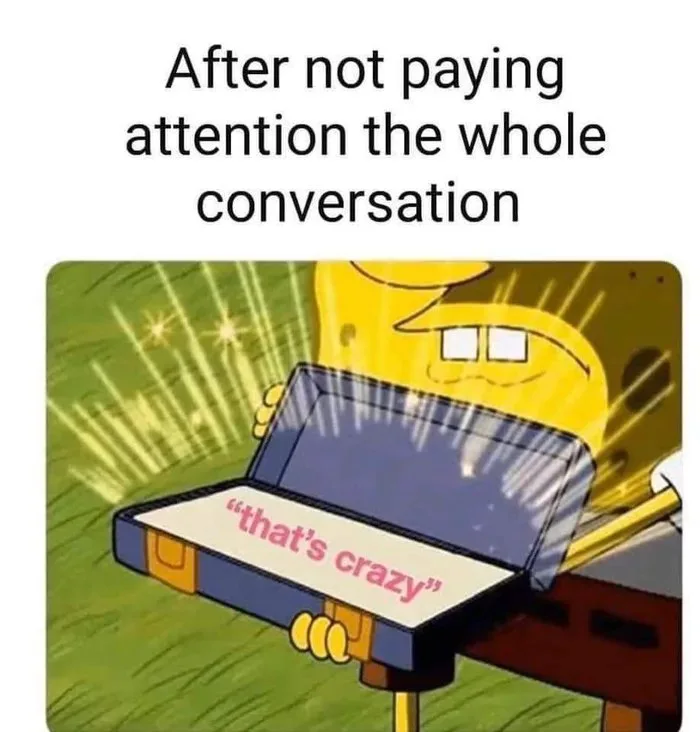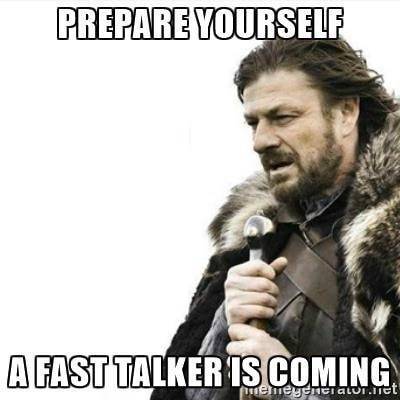Some people talk like they’re auctioneers on speed, while others speak like that one sloth in Zootopia.
But, most of us have a smidge of control over our talking speed.
So, is fast talking better than slow talking… or vice-versa?
In short, it depends on the situation.
1. When You Want to Look Smart
WINNER: Fast Talking (at least, if you're in the US)
Quickness of speech has nothing to do with your intelligence.
Einstein was not a fast talker.
Yet, fast speakers are often viewed as more intelligent.
In fact, actors in the US get instructed to speak faster when they play intelligent characters. Think Aaron Sorkin. Scriptwriters believe that the faster a character speaks, the more clever and competent they come off.
This idea is backed up by research that Norman Miller and his colleagues conducted in 1976. Their data suggested that people who spoke faster seemed more credible to listeners. Fast speech signaled confidence, intelligence, objectivity, and knowledge. After all, it takes a certain amount of mental firepower to quickly construct and present thoughts.
That said, cultural factors may be at play.
Norman Miller’s study was conducted only in the United States.
2. When You Want to Get People Excited
WINNER: Fast Talking

Research by Stephen Smith and David Shaffer in 1995 suggested that fast talking is associated with anger, excitement and fear. If you’re trying to elicit any of these emotions at any point in a conversation or presentation, speeding up your speech can help.
People naturally talk faster when they get excited. So when you signal your excitement with fast speech, the listener’s experience will mirror that emotion.
3. When You Want to Communicate Effectively
WINNER: Slow Talking

Many of us believe that we need to say a lot of words to communicate the essence of our thoughts. But we often overlook the fact that the human brain can only recall 4-7 chunks of information at a time.
If you speak 300 words, and the listener can only hold 10 of them, what are the other 290 words good for? Probably not much. Even worse is that the listener may internalize only the least important seven words to your message.
Fast speech rates lower a person’s ability to comprehend and understand what the other person is saying and why they are saying it.
The more you slow down your speech, the more the listener’s comprehension will increase.
When you speak many words at high speed, you are “setting the table” for miscommunication. So when you have something important to say, slow down, be brief, and convey the essence of your message in 10 words or less. This will make sure your message lands. Besides, research shows that fast speech correlates with lower information content. So you probably didn’t need all those quickly spoken words anyway.
When you communicate slowly and mindfully, you’ll be surprised by how few words you need.
4. When You Want a Soul-to-soul Connection
WINNER: Slow Talking
Ever notice that whenever there is a big, romantic moment between people in a movie the tempo of speech between characters slows?
When we are highly focused or deeply connected to another person, our speech rate naturally slows down and we speak less.
You can easily train your voice to convey more trust to others by slowing down your speech rate and dropping your pitch. This was tested at the University of Houston. When doctors spoke slower, the listeners perceived them as “more caring and sympathetic.”
By slowing your speech you can dramatically increase intimacy and empathy through your conversations. And, as noted above, you will be communicating more effectively. Effective communication opens doors to deeper relationships more intimate connections with others.
5. When You Want to be Persuasive
WINNER: It depends...
According to Miller’s research, when people spoke at 195 words per a minute (a speedy conversational pace) they were more persuasive than at 100 words per minute (a slower conversational pace). This result led researchers to the conclusion that fast talking was predictably better for persuasion.
In this study, Miller and fellow researchers tried to convince participants that caffeine was bad for them. Presenters that spoke faster were more convincing than others.
This study is seems humorous to witness. Imagine a person speaking at a hyper-caffeinated pace explaining the dangers of coffee. Nevertheless, the findings seemed to support the notion that if you speak faster, you were more persuasive.
Later, researchers began to wonder if this was really true.
Further research showed that:
- Fast talking is more persuasive when the audience is inclined to disagree with the speaker.
- Slow talking is more persuasive when the audience is open-minded.

Here's why
It boils down to the fact that fast-talkers are less comprehensible. When a fast-talker delivers a message to a disagreeable crowd, there isn’t much time for the audience to come up with counter-arguments. And when they fail to come up with counter-arguments, they are more persuaded.
It works the other way around when the audience is more open and likes the speaker’s message. When a message is delivered slowly, there is plenty of time for the listeners to resonate with speaker and agree more deeply.

Staying Mindful in Our Communication
Although there are some contexts where fast talking can be useful, the research shows that slow talking is way better for communicating and connecting with others.
Before entering a discussion, consider asking yourself what your intention is. This will help you enter a mindful state as you proceed. Most likely, you want to feel a connection and communicate clearly with whomever you are talking to. And if that’s true, you should slow your speech rate.
If you train with the exercise below, you will change your brain in ways that can dramatically improve your communication skills and social intelligence.
Neuro-Exercise:
The 10-10 Communication Game
Try this brain-training game with a partner.
The object of the game is to have a conversation where each person takes turns speaking only 10 words or less.
Each person holds their fists in front of them. For each word spoken the speaker raises one finger. When the speaker has raised all 10 fingers, the speaker’s turn is over. Then, the other person has to respond in 10 words or less.
Do this while deeply listening and paying close attention to facial expressions.
At first you’ll feel a little weird, but the finger counting slows down your mind, and then it actually becomes easier for your brain to select essential words that convey more precisely what you mean. The slower speaking also improves improving neural comprehension in the listener’s brain, and it becomes more difficult to feel anxiety or irritability, two emotional qualities that derail the communication process.
Of course, this is just a training exercise, but when it comes to effective speaking and problem solving, we recommend that you try your best to adhere to the 20-Second “Rule,” speaking for no longer than 20 seconds – and much less when you want to convey a key point or concept. Twenty seconds is about how long it takes to speak 3 sentences, but you’ll still have to count out your words on your fingers until you build the intuitive skill of speaking briefly. Without your fingers, you’ll probably say too much and muddle the effectiveness of your conversation. With them, you can solve problems in a quarter of the time it normally takes.

Dive Deeper
Effects of anonymity on antisocial behavior committed by individuals.
Nogami T, Takai J. Psychol Rep. 2008 Feb;102(1):119-30.
Eyes are on us, but nobody cares: are eye cues relevant for strong reciprocity?
Fehr E, Schneider F. Proc Biol Sci. 2010 May 7;277(1686):1315-23.
Evaluating faces on trustworthiness: an extension of systems for recognition of emotions signaling approach/avoidance behaviors.
Todorov A. Ann N Y Acad Sci. 2008 Mar;1124:208-24.
Common neural mechanisms for the evaluation of facial trustworthiness and emotional expressions as revealed by behavioral adaptation.
Engell AD, Todorov A, Haxby JV. Perception. 2010;39(7):931-41.
Use of affective prosody by young and older adults.
Dupuis K, Pichora-Fuller MK. Psychol Aging. 2010 Mar;25(1):16-29.
“Worth a thousand words”: absolute and relative decoding of nonlinguistic affect vocalizations.
Hawk ST, van Kleef GA, Fischer AH, van der Schalk J. Emotion. 2009 Jun;9(3):293-305.
Leadership = Communication? The Relations of Leaders’ Communication Styles with Leadership Styles, Knowledge Sharing and Leadership Outcomes.
de Vries RE, Bakker-Pieper A, Oostenveld W. J Bus Psychol. 2010 Sep;25(3):367-380.
Voice analysis during bad news discussion in oncology: reduced pitch, decreased speaking rate, and nonverbal communication of empathy.
McHenry M, Parker PA, Baile WF, Lenzi R. Support Care Cancer. 2011 May 15.
Components of placebo effect: randomised controlled trial in patients with irritable bowel syndrome.
Kaptchuk TJ, Kelley JM, Conboy LA, Davis RB, Kerr CE, Jacobson EE, Kirsch I, Schyner RN, Nam BH, Nguyen LT, Park M, Rivers AL, McManus C, Kokkotou E, Drossman DA, Goldman P, Lembo AJ. BMJ. 2008 May 3;336(7651):999-1003.
Use of affective prosody by young and older adults.
Dupuis K, Pichora-Fuller MK. Psychol Aging. 2010 Mar;25(1):16-29.
Gestures orchestrate brain networks for language understanding.
Skipper JI, Goldin-Meadow S, Nusbaum HC, Small SL. Curr Biol. 2009 Apr 28;19(8):661-7.
When language meets action: the neural integration of gesture and speech.
Willems RM, Ozyürek A, Hagoort P. Cereb Cortex. 2007 Oct;17(10):2322-33.
2-3X Your
Learning Speed

Kensho: Short Film Perfectly Captures “The Dream of Life”
Kenshō (見性): A Japanese term from the Zen tradition. Ken means “seeing,” shō means “nature, essence” If you awaken from

Alan Watts on the Art of Meditation
https://www.youtube.com/watch?v=gd2Ot6hLCtM Alan Watts on the art of meditation and why it is important to practice it: “A person who thinks

A Simple Way to Mind Read
“When I wish to find out how wise, or how stupid, or how good, or how wicked is any one,

Research Suggests Sunshine Helps Your Mind Stay Sharp
According to a recent study by Duke University, getting sun can help keep your mind sharp. One of the benefits


Great useful info based in science. thx!
this was very helpful thankyou, Keanen Theron